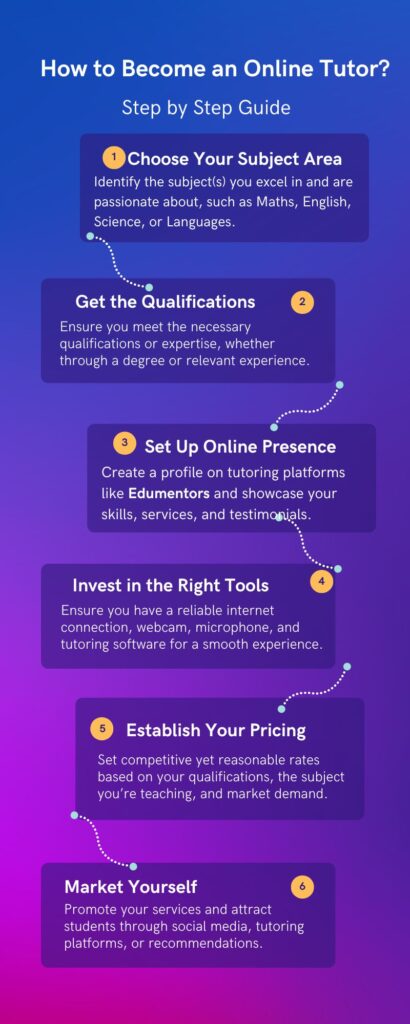Many people are asking how to become an online tutor, especially as online tutoring continues to grow in popularity. Online tutoring is the process of teaching or helping students through the internet. It allows tutors to connect with learners anywhere in the world, making education more accessible and flexible than ever before. This has opened up new opportunities for both tutors and students, breaking down the barriers of location and schedule.
The role of online tutors in modern education is increasingly significant. They provide one-on-one support, helping students achieve their learning goals, whether for school exams or professional development. Online tutoring jobs offer flexibility, allowing tutors to work from home or anywhere they choose, while offering students personalised learning experiences. Online tutors cater to various needs, from homework help to in-depth subject tutoring, making education more personalised and effective for students.
As more people explore how to become an online tutor, it’s clear that this field is not just a passing trend. The growing demand for online tutoring jobs makes it a promising career option for those passionate about teaching.

How to Become an Online Tutor: Essential Steps
Becoming an online tutor is an exciting journey, but it starts with understanding your strengths. The first step is to identify your expertise. What subjects or skills are you passionate about teaching? Are you good at math, english, science or even arabic? When you teach something you enjoy, it’s easier to stay motivated, and your enthusiasm will help students engage better. Whether you want to teach English, math, or other subjects, recognising your area of expertise is key to becoming a successful tutor.
Next, you’ll need to meet educational requirements. While formal qualifications like degrees or certifications are not always mandatory, they can certainly benefit. For example, if you want to become an online English tutor, having a degree in English or a relevant teaching certification can make you more interesting to potential students. Similarly, if you’re teaching how to become an online tutor in the UK, it helps to have a background that supports your knowledge of the educational system.
Even if you don’t have formal qualifications, don’t worry! How to become an online tutor with no experience is still very possible. You can gain credibility by showcasing any relevant skills or informal teaching experience. Experience-even through tutoring friends or volunteering-is a great way to get started. Acordingly, the more experience you gain, the more you’ll build your confidence and grow your tutoring reputation.
Transitioning from informal teaching to becoming a paid tutor is all about building relevant experience. As you practice and improve your teaching skills, you’ll naturally get better and more comfortable. Plus, experience helps you learn what works best for your students and allows you to develop your own teaching style.

Starting an Online Tutoring Journey? Here’s What You Need to Know
Once you’ve decided how to become an online tutor, the next step is setting up your online tutoring business. This involves choosing the right platform, creating an engaging profile, and setting your rates and schedule. Let’s break it down.
1. Choose a Tutoring Platform
Start by selecting the right platform, such as Tutor.com, Edumentors, Preply, or Chegg Tutors, where you can connect with students. Alternatively, you can go independent and promote your services through your website or social media. Consider factors like fees, subjects offered, and user base when choosing the best platform for you.
2. Create an Engaging Profile
Your profile is your first chance to impress students. Make it professional and highlight your qualifications, expertise, and what sets you apart. Even if you’re new, mention any informal teaching experience and show your passion for tutoring. A friendly tone and a professional photo will help students feel comfortable.
3. Set Your Rates and Schedule
Once your profile is ready, it’s time to decide on rates and set your availability. Research what other tutors in your field charge and consider starting with a competitive rate to build your experience. Being flexible with hours, such as offering evening or weekend sessions, can help attract more clients, whether you’re looking for online tutoring jobs or more professional opportunities.
By following these steps, you’ll be well on your way to building a successful online tutoring business. The flexibility of online tutoring jobs allows you to work from anywhere, set your own hours, and choose the subjects that align with your expertise.

How to Become an Online Tutor: Effective Teaching Strategies
To succeed in online tutoring, using the right strategies can significantly enhance the learning experience. Here are some tips to help you along the way:
How to Become an Online Tutor? Utilize Technology
The right tools can make online learning more engaging. Platforms like Zoom and Google Meet are great for live lessons, while tools like Google Docs and Quizlet can aid in collaborative learning and quizzes. Familiarity with these tools is key before wondering about how to become an online tutor in the UK.
Engage Students
Keeping students motivated online can be challenging. Use interactive activities, multimedia, and quick exercises to break up the session and keep them involved. Encourage students to ask questions and share their thoughts, helping them stay connected with the lesson.
Continuous Improvement
Seek feedback from your students to improve your tutoring methods. Also, take advantage of professional development opportunities to refine your skills and stay updated with the latest teaching trends. If you’re new to online tutoring jobs, constantly improving your approach will make you more effective.
These strategies will help you offer a more engaging and impactful tutoring experience, leading to better results for your students.

How to Become an Online Tutor in UK: Challenges and Solutions
Online tutoring can be incredibly rewarding, but like any job, it comes with its own set of challenges. Here are some common obstacles and how to overcome them:
One of the most frequent challenges in online tutoring is dealing with technical problems, such as poor internet connection or software glitches. To minimise disruptions, ensure you have a stable internet connection and test your software before each session. If issues do arise, keep your students informed and have backup plans, like switching platforms or using audio-only sessions. As how to become an online tutor involves using technology, becoming familiar with troubleshooting basics will help you handle these situations with ease.
Another common challenge is Time Management. As a fact, Balancing tutoring with other commitments can be tricky, especially if you’re new to online tutoring jobs. Set clear boundaries by creating a flexible schedule that works for both you and your students. Use time-management tools like calendars or scheduling apps to keep track of sessions. This will help you stay organised and ensure you give your students the best possible experience.
Conclusion
So, how to become an online tutor? It’s all about identifying your expertise, gaining experience, choosing the right platform, and continuously improving your skills. You’ve learned how to set up your online tutoring business, engage students, and handle challenges like technical issues and time management. By following these steps, you’ll be on your way to becoming a successful online tutor.
If you’re ready to take the next step, don’t wait! Online tutoring jobs offer a flexible and rewarding career, whether you’re helping students with English, math, or other subjects. Whether you’re looking to become an online tutor or explore online tutoring jobs, there are countless opportunities available.
If you’re eager to start your tutoring journey, why not take the first step today and explore the exciting opportunities available to become an online tutor? With their easy-to-use platform and diverse tutoring options, it’s the perfect place to begin your online teaching career and make a positive impact on students’ lives.
FAQs:
How to become an online tutor?
To become an online tutor, the first step is to identify your area of expertise, whether it’s a specific subject or skill. You’ll also need to choose the right tutoring platform, create an engaging profile, and set competitive rates. Online tutoring jobs can be found through popular platforms like Preply, Edumentors, Tutor.com, or even by promoting your own services.
What qualifications do you need to be an online tutor?
While formal qualifications like a degree or teaching certification can help, they are not always required. Many platforms allow tutors to teach based on experience and knowledge. For example, to become an online English tutor, having a degree in English or a TEFL certification would be beneficial. However, if you’re teaching subjects like math or science, a relevant degree or teaching experience can give you an edge.
How much do online tutors make in the UK?
The amount an online tutor can make in the UK varies widely based on experience, the subject taught, and the platform used. On average, online tutors in the UK earn between £15 to £30 per hour. Tutors for more specialised subjects or advanced levels (such as A-Level or university-level tutoring) can charge higher rates.
How to become an online tutor in the UK?
To become an online tutor in the UK, start by choosing a subject or skill you’re passionate about teaching. Platforms like Tutorful, Edumentors or Superprof are excellent places to get started. You’ll need to set up an engaging profile, complete with your qualifications and teaching experience, and decide on your rates. It’s important to be familiar with the UK curriculum if you’re tutoring school subjects.
How to become an online tutor with no experience?
If you’re wondering how to become an online tutor with no experience, start by offering informal tutoring to friends, family, or local students to build up your skills. You can also take online courses or gain a relevant certification to improve your qualifications.








